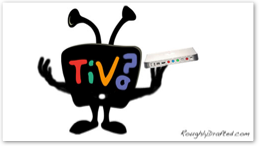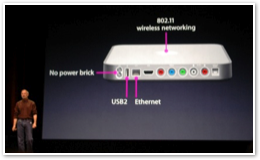





Steve Jobs described the iTV as Apple's entry into the living room, as if it were a strategic move in a larger game plan. But with several wireless TV extenders already on the market, why will Apple's be any different?
One could have asked the same question of the iPod in 2001, when there was a similar variety of music players already available. Early reviews suggested Apple's product was simply nothing new, that it just had a bigger price tag. Why did the iPod clean up the market? For starters, it leveraged some key Apple assets:
-
•Well designed hardware specifically tailored for its intended use.
-
•An uncluttered, simple, and easy to use interface that works well.
Cousins, Identical Cousins

The iPod shares a similar price point and feature set with the iTV. That helps provide some clues of what the iTV will be able to do. Both need primarily to decompress audio and video from a hard drive, but instead of creating output for headphones and a small display, the iTV will use digital audio ports and component video, or its HDMI AV connector.
The other obvious difference between the two is that the iTV has a direct power cable instead of running off a battery. That allows it to to connect with an iTunes PC via wireless or Ethernet, instead of a dock.
That also means the wireless networking on the iTV will have a functional purpose beyond frustrating users with slowly shared, adware wrapped exploding media while the battery quickly dies.
Zing! Snaps on Zune!
That's why the iTV will be much more like an upscaled iPod than a downscaled PC. Microsoft has been trying to resell the PC in the form of MSN TV and the Windows Media Center and is simply not doing so well with that strategy.
The most obvious advantage this gives Apple is a much lower price point. It's rather hard to scale a standard PC down to $299 while providing HD video and optical digital audio outputs. By targeting the iTV directly at its intended purpose rather than lobbing a PC at every problem, Apple ends up with a product that sells itself.
Engineering vs Marketing
This is another example of how Apple competes as a technology company: it finds what users need, then engineers a product designed to meet those needs, often in innovative ways. Apple's approach can be seen in the design of the iPod, but also in software, from its iLife apps to pro apps such as Aperture.
The public is so used to me-too style copying that Aperture was quickly dubbed a Photoshop rival until people realized that Aperture wasn't a new Photoshop at all, but rather represented a new workflow tool for photographers; the two products share little overlap.
There's simply not much point in trying to mimic successful, established products unless it's possible to effectively compete on price. In order to deliver sales, a new product has to add significant new value. If the value is already being delivered, where's the opportunity?

Auf der Hand
In contrast Microsoft--as primarily a marketing company--takes existing products and tries to sell them as the solution to the problem at hand.
So while Apple designed the Newton as a unique system with a unique interface designed for mobile computing, Microsoft designed its WinCE PDA as a handheld PC using the same Windows desktop conventions it created for the desktop PC.
Both efforts failed, largely due to the availability of a cheaper, simpler option in the Palm Pilot. Neither Apple nor Microsoft managed to deliver enough value to a wide enough audience to create a sustainable PDA product. Apple shot too high, Microsoft just sprayed gunfire around randomly, but neither hit the target of price and features to create a product with significant sales.
PC Über Alles
Microsoft has similarly sprayed PC bullets into other markets in vain attempts to hit things. It fired the desktop PC towards a media center target; it replaced the WebTV set top box with an MSN-branded, thin PC bullet that misfired; and it repacked the desktop PC into the shell of the Xbox game console and blew up billions of dollars.
Now, Microsoft is again simply rebranding the failed Toshiba Gigabeat as its Zune. While this is a fast and cost effective way to deliver a product, refiring the same old bullets hasn't proven very successful for the company in the past. The reason: it adds little value for consumers, so they don’t buy it.
Microsoft's most promising product category is the Xbox 360, a custom designed, closed platform that borrows strategies from Sony's Playstation and Apple's Macintosh. While it still makes no money in hardware sales, it at least involves a business model that makes up for those losses with lucrative software sales and licensing.
How iTV will Add Value
There are five areas where the iTV can add value for users in ways that existing products haven't. Rather than trying to be everything to everyone, Apple has clearly targeted markets that represent low hanging fruit waiting to be picked.

In its first year of iTV, Apple isn't going to deliver a magical $299 box that replaces the Tivo, Media Center and other DVRs; Netflix , other DVDs rentals, and DVD sales; broadcast TV; or the Xbox, PlayStation, and Wii.
, other DVDs rentals, and DVD sales; broadcast TV; or the Xbox, PlayStation, and Wii.
Apple doesn't need to “kill” any of those products in order to be wildly successful. In fact, iTV will offer the most value to consumers by integrating well with the products they already use.
Again, consider the iPod: it plays consumers' own CD tracks and MP3 downloads, podcasts, as well as commercial downloads from the iTunes Store. The iPod didn't kill the CD, it embraced it and added value to consumers' existing CD music collections by making them more portable and accessible.
I've identified five categories of content where Apple can do the same with the iTV. Coming up next: the first of five ways Apple will change TV--by adding value to existing content.
This Series

Why Apple Will Change TV
Saturday, September 30, 2006






Ad







 Bookmark on Del.icio.us
Bookmark on Del.icio.us Discuss on Reddit
Discuss on Reddit Critically review on NewsTrust
Critically review on NewsTrust Forward to Friends
Forward to Friends
 Get RSS Feed
Get RSS Feed Download RSS Widget
Download RSS Widget

